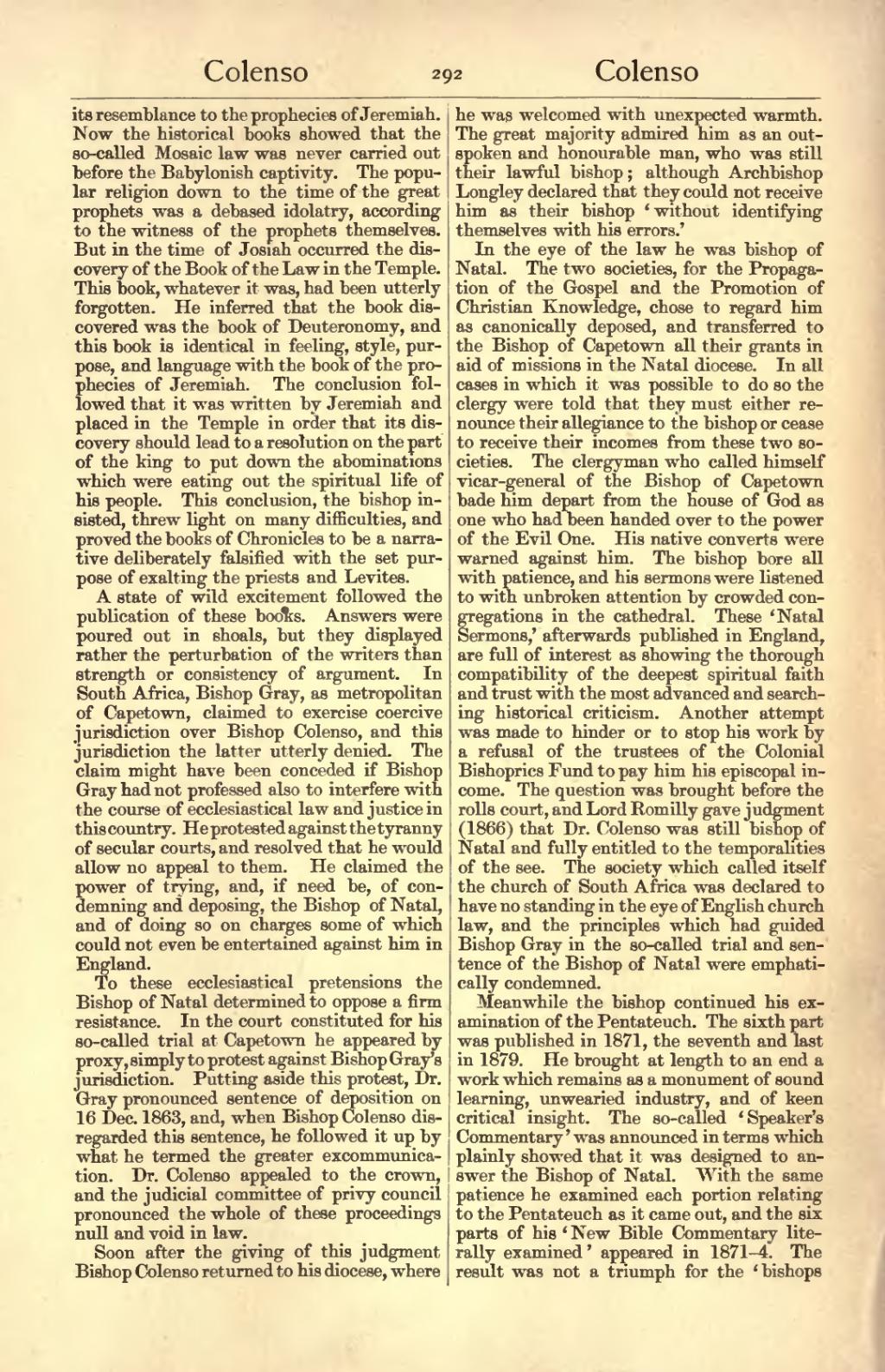its resemblance to the prophecies of Jeremiah. Now the historical books showed that the so-called Mosaic law was never carried out before the Babylonish captivity. The popular religion down to the time of the great prophets was a debased idolatry, according to the witness of the prophets themselves. But in the time of Josiah occurred the discovery of the Book of the Law in the Temple. This book, whatever it was, had been utterly forgotten. He inferred that the book discovered was the book of Deuteronomy, and this book is identical in feeling, style, purpose, and language with the book of the prophecies of Jeremiah. The conclusion followed that it was written by Jeremiah and placed in the Temple in order that its discovery should lead to a resolution on the part of the king to put down the abominations which were eating out the spiritual life of his people. This conclusion, the bishop insisted, threw light on many difficulties, and proved the books of Chronicles to be a narrative deliberately falsified with the set purpose of exalting the priests and Levites.
A state of wild excitement followed the publication of these boots. Answers were poured out in shoals, but they displayed rather the perturbation of the writers than strength or consistency of argument. In South Africa, Bishop Gray, as metropolitan of Capetown, claimed to exercise coercive jurisdiction over Bishop Colenso, and this jurisdiction the latter utterly denied. The claim might have been conceded if Bishop Gray had not professed also to interfere with the course of ecclesiastical law and justice in this country. He protested against the tyranny of secular courts, and resolved that he would allow no appeal to them. He claimed the power of trying, and, if need be, of condemning and deposing, the Bishop of Natal, and of doing so on charges some of which could not even be entertained against him in England.
To these ecclesiastical pretensions the Bishop of Natal determined to oppose a firm resistance. In the court constituted for his so-called trial at Capetown he appeared by proxy, simply to protest against Bishop Gray's jurisdiction. Putting aside this protest, Dr. Gray pronounced sentence of deposition on 16 Dec. 1863, and, when Bishop Colenso disregarded this sentence, he followed it up by what he termed the greater excommunication. Dr. Colenso appealed to the crown, and the judicial committee of privy council pronounced the whole of these proceedings null and void in law.
Soon after the giving of this judgment Bishop Colenso returned to his diocese, where he was welcomed with unexpected warmth. The great majority admired him as an outspoken and honourable man, who was still their lawful bishop; although Archbishop Longley declared that they could not receive him as their bishop 'without identifying themselves with his errors.'
In the eye of the law he was bishop of Natal. The two societies, for the Propagation of the Gospel and the Promotion of Christian Knowledge, chose to regard him as canonically deposed, and transferred to the Bishop of Capetown all their grants in aid of missions in the Natal diocese. In all cases in which it was possible to do so the clergy were told that they must either renounce their allegiance to the bishop or cease to receive their incomes from these two societies. The clergyman who called himself vicar-general of the Bishop of Capetown bade him depart from the house of God as one who had been handed over to the power of the Evil One. His native converts were warned against him. The bishop bore all with patience, and his sermons were listened to with unbroken attention by crowded congregations in the cathedral. These 'Natal Sermons,' afterwards published in England, are full of interest as showing the thorough compatibility of the deepest spiritual faith and trust with the most advanced and searching historical criticism. Another attempt was made to hinder or to stop his work by a refusal of the trustees of the Colonial Bishoprics Fund to pay him his episcopal income. The question was brought before the rolls court, and Lord Romilly gave judgment (1866) that Dr. Colenso was still bishop of Natal and fully entitled to the temporalities of the see. The society which called itself the church of South Africa was declared to have no standing in the eye of English church law, and the principles which had guided Bishop Gray in the so-called trial and sentence of the Bishop of Natal were emphatically condemned.
Meanwhile the bishop continued his examination of the Pentateuch. The sixth part was published in 1871, the seventh and last in 1879. He brought at length to an end a work which remains as a monument of sound learning, unwearied industry, and of keen critical insight. The so-called 'Speaker's Commentary' was announced in terms which plainly showed that it was designed to answer the Bishop of Natal. With the same patience he examined each portion relating to the Pentateuch as it came out, and the six parts of his 'New Bible Commentary literally examined' appeared in 1871-4. The result was not a triumph for the 'bishops

